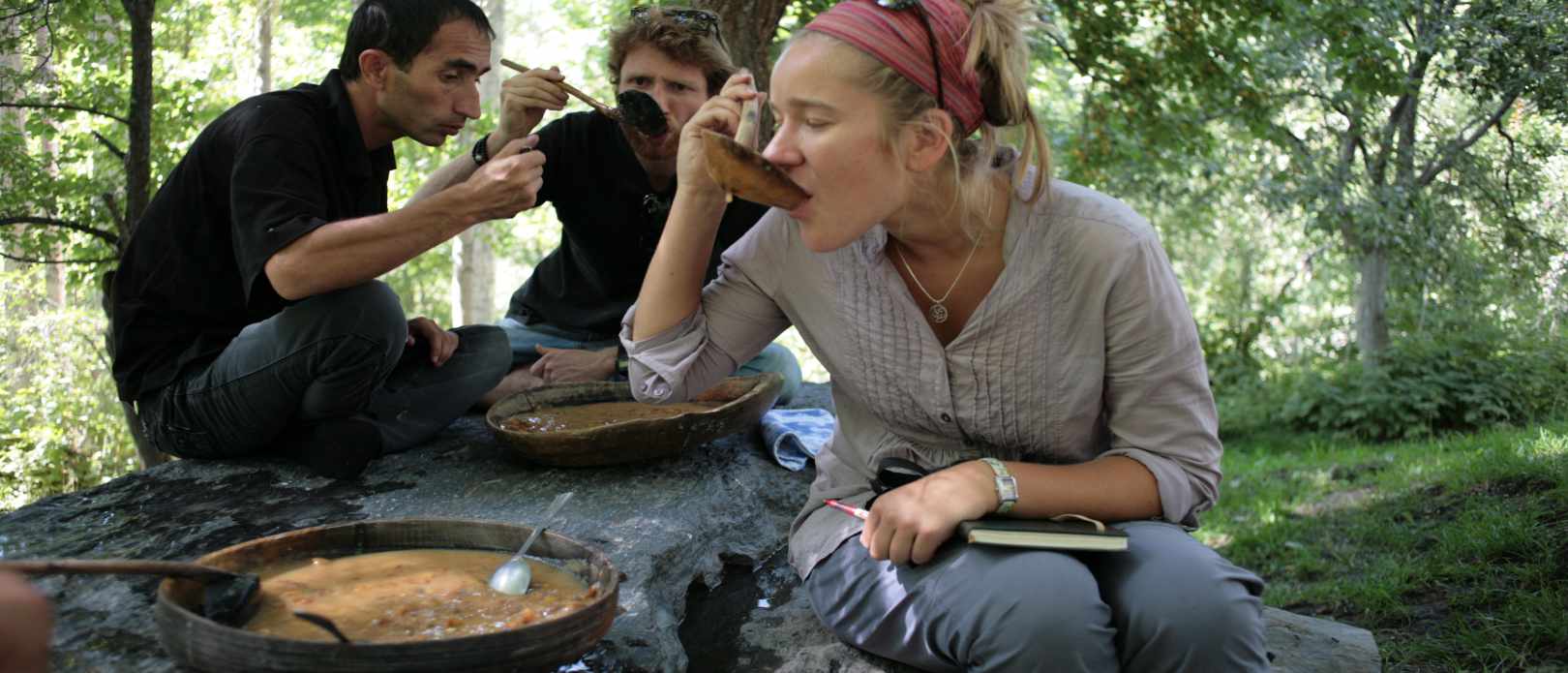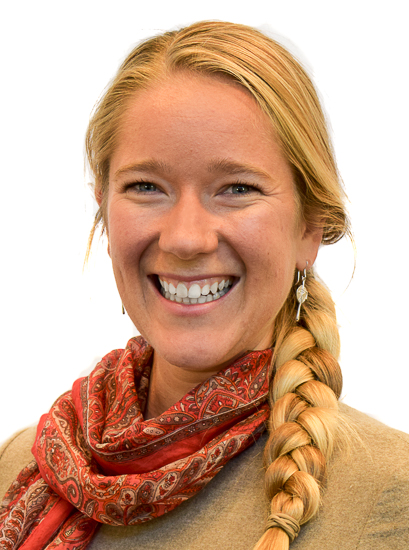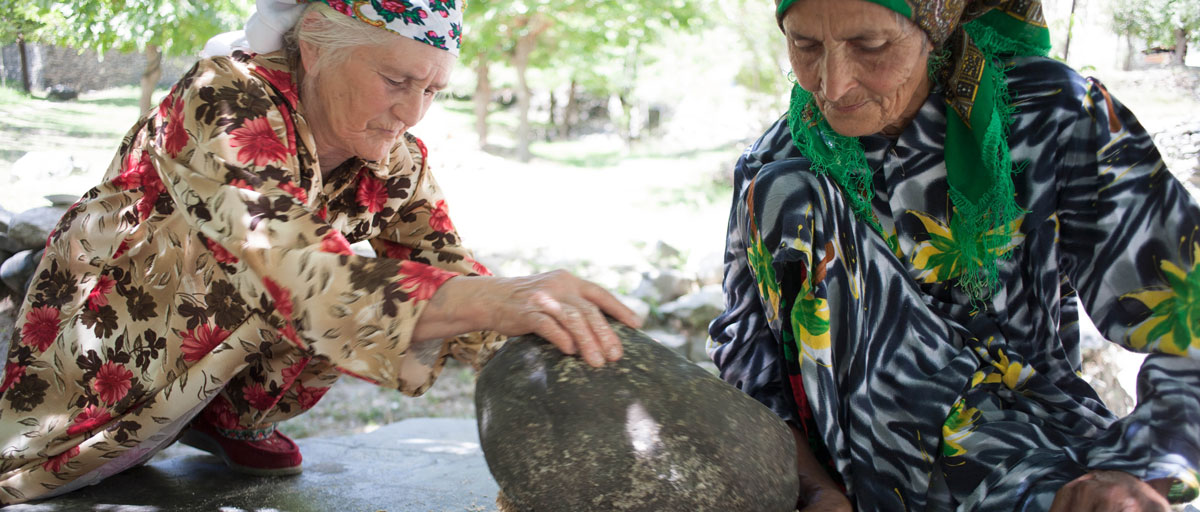World Sustainable Gastronomy Day
The accidental chef

Jamila Haider. Photo: J. Quax
How a former PhD student’s book on food and life in the Pamir Mountains won the world’s most prestigious culinary book award
- June 18 is World Sustainable Gastronomy Day, a day to acknowledge food's important role in cultural expression
- In 2015 centre researcher Jamila Haider published "With Our Own Hands: A celebration of food and life in the Pamir Mountains of Afghanistan and Tajikistan"
- The year after it won the Best Cookbook of the Year from the Gourmand World Cookbook Award, the most prestigious and largest award in the culinary calendar
WHEN VISITING THE PAMIR MOUNTAINS between Afghanistan and Tajikistan gastronomy may not be the first thing that comes to your mind. The British explorer St George Littledale described it in 1892 as “a region where for the most part there is neither fuel nor fodder […] with nine months winter and three months winds and frosts”.
Exploring the food was not on centre researcher Jamila Haider’s mind either when she first went there in 2009. Embarking on an international development project she spent one and a half years in the Tajik town of Khorog, bordering Afghanistan.
The request from a grandmother
During this time, she fell in love with the Pamirs, the mountains and their people. But she also noticed how the Pamirs were on a trajectory towards modernisation, losing a lot of its intrinsic wealth.
So when a grandmother in the Ghund Valley of the Tajik Pamir Mountains asked Haider and her friend and colleague Frederik van Oudenhoven to write down her old recipes, it became an opportunity to document an agricultural, cultural and linguistic diversiy that was about to be lost.
Conversations about recipes soon became conversations about age-old traditions and the rapid social and ecological changes that are happening in the region.
The result of the work became the 2015 book With Our Own Hands: A celebration of food and life in the Pamir Mountains of Afghanistan and Tajikistan.
In 2016 it won the Best Cookbook of the Year from the Gourmand World Cookbook Award, the most prestigious and largest award in the culinary calendar.
The panel of judges described the richly illustrated book as “revolutionary”. Charles, Prince of Wales, wrote the foreword of the book stating that: “The authors of this work have done us a great service in showing us what is at stake: the loss of thousands of years of learning and wisdom, as well as a unique environment which, once lost, cannot be regained.”

Frederik van Oudenhoven (pictured) accepted the Gourmand World Cookbook Award on behalf of himself and Jamila Haider in May 2016.
An amazing journey
Many travellers to the Tajik Pamirs might wonder why a culture with such deeply rooted traditions does not also have a food culture.
"However, it would be better to ask why so little of the art of traditional Pamiri cooking is visible to outsiders,” Haider says.
It is thought that rye originated in the Pamir Mountains, and it is home to a rich diversity of walnuts, apples, apricots and over 150 varieties of wheat.
Traditional Pamiri food is as diverse as it is tasty and wonderful.
Jamila Haider
Take Osh, for instance, a noodle soup typically made of our made from rye, wheat, grass pea, faba bean, pea, lentil and sometimes chickpea. The soup caught Haider’s attention almost from the start, just like mulberries, “the fruit from paradise” which has saved thousands of Pamiri people from starvation.
From 1992, when the Tajik Civil War began, until 1997, the entire area was cut off from the outside world by armed forces. Mulberries were one of the very few sources of sugar and vitamins they had access to, and were ground into our for daily bread.
It has been an amazing and inspiring journey, learning about the lives of so many people and their landscapes through the lens of cooking, sharing and talking about food.
Jamila Haider

In October 2015 Haider and van Oudenhovenreturned to distribute 1700 copies to the villages in the region. “We wrote it for the Pamiri people,” Haider says.
Developing without losing identity
Jamila's research is driven by finding ways for regions, landscapes and communities to develop without losing the rich biological and cultural diversity that is so central to their character and resilience.
Preparing and celebrating food with people, and engaging in daily biocultural practice, helped uncover visions for a future in which progress and well-being are deeply intertwined with the ecology and culture of the landscapes.
As for George Littledale’s curbed enthusiasm about the region, he will get little sympathy from Jamila. “There is something about the Pamirs that always draws me back,” she says.
When I close my eyes to think of a happy place I often find myself lying in a Pamiri meadow.
Jamila Haider
Watch the documentary "Wisdom of the mountains, available to rent here
Wisdom of the mountains from Van Osch Films on Vimeo.

Jamila Haider studies how development interventions can improve human well-being in food systems without eroding biological and cultural diversity








